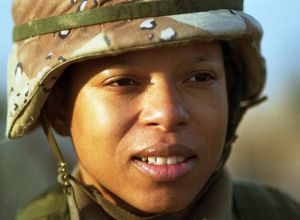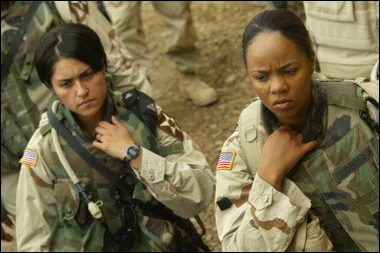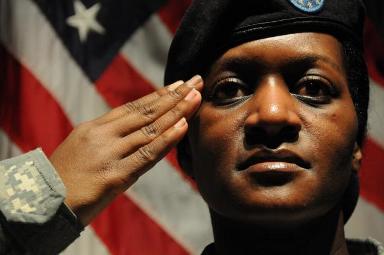 In growing numbers, African American women are entering the armed forces, and putting their lives on the line, both literally and figuratively to serve the United States. As many know, countless members of the armed forces have died serving their country. But few people recognize that soldiers also sacrifice their mental health through their service as well. Out of the 150,000 women who have been deployed to Iraq and Afghanistan since 2002, 23% of them are African-American. Post Traumatic Stress Disorder (PTSD) is a severe anxiety disorder that can develop after an individual is experiences any event that results in psychological trauma. Many soldiers, particularly African American women, are experiencing PTSD at alarming rates, and worse, this country is ill-equipped to properly assist them in their struggle, at least at the present moment.
In growing numbers, African American women are entering the armed forces, and putting their lives on the line, both literally and figuratively to serve the United States. As many know, countless members of the armed forces have died serving their country. But few people recognize that soldiers also sacrifice their mental health through their service as well. Out of the 150,000 women who have been deployed to Iraq and Afghanistan since 2002, 23% of them are African-American. Post Traumatic Stress Disorder (PTSD) is a severe anxiety disorder that can develop after an individual is experiences any event that results in psychological trauma. Many soldiers, particularly African American women, are experiencing PTSD at alarming rates, and worse, this country is ill-equipped to properly assist them in their struggle, at least at the present moment.
African American women in combat zones continue to experience higher rates of PTSD due to assaults that are never reported. To make matters worse, only 15 Veteran Affairs centers in the United States provide residential mental-health treatment specifically for women with PTSD. Thus, it’s truly become a struggle for African American women to reintegrate themselves back into their civilian lives and begin the process to heal from PTSD.

Dr. John D. Moore, a professor of Health Sciences at the American Public University System, shares, “I have worked with some African American women who have returned from different overseas operations and have reported they were reluctant to seek out treatment for PTSD or other mental health issues because they feared they would be looked at as ‘weak’ by others.”
African American women have become infamous for always wearing the “strong woman complex,” which has hurt them particularly in the realm of mental health and sexual trauma. But in the military, strength is certainly something that’s cultivated and encouraged to be exemplified. Women, in particular, constantly feel the pressure to measure up to their male counterparts, especially in combat zones, and African American women in the military experience another layer of pressure, as many are breadwinners for their families back home.
“African American women particularly I have worked with report intense concerns about being ‘kicked out’ of the military. We have to remember that many women today serving in our Armed Forces are the breadwinners for their family and that much of the small pay they receive is sent back home to support loved ones,” says Dr. Moore.

According to the United States Department of Veteran Affairs, 7-8% of the U.S. population at large will have PTSD at some point in their lives, and about 5.2 million adults have PTSD during a given year. Women are more likely to develop PTSD with approximately 10% of women developing PTSD compared to 5% of men. The reasons for this are multifaceted and complex, particularly in the military, as many women soldiers experience sexual trauma that’s often served as a catalyst for PTSD, and left unaddressed.
 But these women aren’t the only individuals affected by their pain, as family and friends of PTSD victims also need resources to cope with their loved one’s trauma. The American Public University System, first founded in 1991 as the American Military University, provides online classes in psychology as a resource for military service members and their loved ones to learn about PTSD, and its effects. They also recommend seeking out professionals within the Veteran Affairs system or therapists in private practice that accept military Tri-Care insurance. Other private practices also can work with PTSD military victims on a sliding scale. In particular for African American women, the African American PTSD Association is also an abundant resource for information.
But these women aren’t the only individuals affected by their pain, as family and friends of PTSD victims also need resources to cope with their loved one’s trauma. The American Public University System, first founded in 1991 as the American Military University, provides online classes in psychology as a resource for military service members and their loved ones to learn about PTSD, and its effects. They also recommend seeking out professionals within the Veteran Affairs system or therapists in private practice that accept military Tri-Care insurance. Other private practices also can work with PTSD military victims on a sliding scale. In particular for African American women, the African American PTSD Association is also an abundant resource for information.
When people hear “PTSD,” the stereotype is white male soldiers in combat. African American women are also victims, and the struggle continues to address this demographic adequately, so that they can heal. PTSD is an equal opportunity destroyer, and more resources are needed to fight its threat to victims, friends, and families.







I have struggled with PTSD for a number of years since leaving Desert Shield/Storm. A life with PTSD and a lack of proper management and continued life events with promotes a higher risk to African American women. We are treated differently many times because of sterotypes.
Feeling sympathy for I didnt endure war there are things we face that can be tramatizing.Having a brother in law and close friend serve in the Desert Storm and tell me of the things they saw and how it affected them it had to be tough
So basically I’m supposed to feel sorry for people, women in particular, who decided to go kill people who they don’t know in other countries for a flag. This seems like a justifiable risk of going to battle. What’s the point of this article? Does anyone think that these black women will be able to successfully sue the government for damages when a WHITE woman contractor and former soldier was raped repeatedly by her fellow contractors and NO ONE came to her defense. Sorry, this is waste. No one wants to have people suffer but this article says NOTHING about how we should be ending the wars or America’s expansion of war which keeps these ladies on multiple tours. Am I supposed to forget about the massive drones attacks in Africa and Afghanistan that are causing not only PTSD in those civic areas but death and destruction to whole family structures. This article is sophomoric. Step it up Frugivore
@Eve: you just do not get it
@CB: Indeed. As a PTSD patient I thought Eve’s comments mighty disingenuous (sp). :-\
Also a bit rude. Just because you don’t support the military action is no reason to kick them at their lowest point.